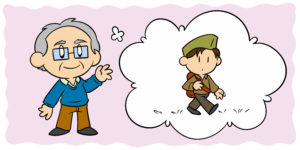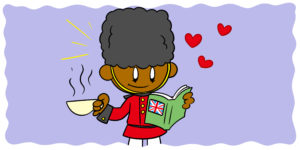There you are, writing some contemporary or YA fiction, when suddenly you feel the urge to drop in some real-world references to other well-known franchises. Maybe you want to let your readers know your character is a video game nerd by namedropping Ghouls ’n Ghosts, or maybe you want to draw conscious stylistic parallels between your own spooky Americana short story and The Twilight Zone and The X-Files. The challenge facing you is twofold: firstly, what’s legal and what’s illegal? And secondly, how do you handle real-world references in-text without being heavy-handed, unconvincing, or cheap?
The law
We’ve talked about the ins and outs of copyright law before, but it’s worth looking at again with a focus on referencing and quoting. After all, although referencing song lyrics or namedropping a novel is a far cry from producing full-blown fan fiction, plagiarism is something no writer wants to be accused of.
Say I’m writing a YA novel and I want to show the reader that my teenage male protagonist is a sensitive, troubled, artistic soul. I know, I think, I’ll have him quote some poetry. So I bypass the obvious go-to poets that adorn edgy teenagers’ bookshelves everywhere (I’ll discuss why later on) and choose, say, Philip Levine. I pick these lines from ‘One Day’:
I will live to see
the day end as I lived to see
the earth turn molten and white– Philip Levine, ‘One Day’, The Simple Truth
And then I’ll panic. Is this legal? Have I quoted too much? Should I have mentioned his name? Should I not? Well, worry not, hypothetical me; actual me knows the answers. There are three ways to justify your reference of copyrighted material (and it’s always worth checking if what you’re referencing is even copyrighted – seventy years after a writer’s death, the copyright expires and their work enters the public domain), and the most important one is fair use, so I’ll explore that first.
Fair use
Fair use is most likely what’ll keep you off the hook for referencing other works. If you’re just namedropping AC/DC, referencing Fifty Shades of Grey, or having a character compare herself to Katniss Everdeen, fair use is what you’ll likely rely on. As a legal defense, fair use hinges upon several factors:
- The purpose and character of your usage, including whether you’re referencing copyrighted material in a commercial, for-profit text, and whether your text is educational and/or valuable,
- The nature of the copyrighted work in question,
- The amount of text referenced and the substantiality of that text,
- The effect on the copyrighted work’s potential market and/or value.
From this, you can pretty much glean that names and small sections of text are almost always going to be fine. After all, if you’re just dropping the copyrighted text’s title, all you’re doing is spreading the word – you’re not detracting from the referenced work’s value and you’re not giving away enough of it to dissuade a given reader from buying that referenced work. With this in mind, it’s a good idea not to go spoiling the ending of any copyrighted stories you might be referencing.
Even my few lines from Levine’s poem would pass under fair use; Levine died in 2015, so while his work is still in copyright, the nature of Levine’s poetry is suitably far from the nature of my own YA novel, and I’m taking only a very short section that, actually, doesn’t make much sense on its own. If anything, I’m helping Levine’s sales by introducing his work to a whole new audience. You’re welcome, Philip.
If you’re referencing whole storylines or are quoting whole paragraphs, consider rethinking your approach. One, because by sharing too much of someone’s book you run the risk of being accused of piracy, and two, because you should be focusing on your own creative work, not someone else’s.
Satire and parody
You’re unlikely to fit too much parody into a simple reference or a few lines of quoted text, but if you jump into lengthier references, bear in mind that parody is only a legal defense if your parody is sufficiently transformative. Consider Mel Brooks’ Spaceballs, a purposefully ham-fisted Star Wars parody full of puns and mimicry. It has a Darth Vader figure called Dark Helmet (he has a really big helmet), a Chewbacca figure (an overweight, foul-mouthed guy in a bear costume), and a Han Solo/Luke figure (comically combined in one cookie-cutter protagonist), and the Force is renamed the Schwarz. The copyrighted material in this case is suitably transformed and is used to poke fun at the original. Of course, it’s not quite clear what the intended transformative message is in the case of Spaceballs, which I guess indicates the fairly liberal legal definition of parody.
When referencing other works, the law is actually on your side.Click To TweetSatire is a different beast, as it isn’t so reliant on the original copyrighted text to make its point, which may itself not even be about the copyrighted text. For example, George Orwell’s Animal Farm borrows indirectly from different fairy tales and children’s books, but it makes points about Stalinism, not about the children’s literature it borrows from. As such, satire is not such a good defense as, frankly, you shouldn’t be borrowing so much from other people if you’re not making points about their work.
Author permission
Fairly obviously, if the copyright owner says you can use whatever you want, you can use whatever you want. Of course, make sure you have permission in legally binding text.
What (and how) should I reference?
Now that we’ve talked about the legality of referencing, we can get to how and why you’d want to do it in the first place. Referencing or quoting other works can do wonders for your world-building, exposition, and character development. After all, references to real-world media tell the reader that your fiction takes place in a recognizable world, which in turn lets them know what to expect, what’s possible, and what should be impossible. In a sci-fi, for example, references to the real world can make the eventual departure from that world more shocking. Similarly, placing characters who like familiar things in unfamiliar contexts helps ground the character and makes them (and thus their otherworldly adventures) more relatable.
Referencing pop culture can be an easy way to establish a character or setting.Click To TweetFinally, as I mentioned in the introduction, having a character like (or dislike) real-world media informs the reader about that character’s taste, personality, and intelligence.
Consider, for example, this passage from John Green’s YA novel Paper Towns:
Ben and Radar showed up at eight on the dot. I got in the backseat. They were shouting along to a song by the Mountain Goats.
– John Green, Paper Towns
This scene suggests, among other things, youthful abandon, the warmth of close friendship, and excitement. It conjures a certain image that, arguably, could also have been conjured by a different, better-known band, but the band in question (an American indie-folk band known for the lead singer’s lyricism) helps indicate the character’s own personal taste and character. This isn’t like Bella Swan in Twilight listing off the canonical writers she’s read – the Mountain Goats aren’t the musical equivalent of whatever turns up after Googling ‘famous writers’ – rather, their brand of sometimes quiet, sometimes rapturous, always powerful music points to the narrating character’s sensitivity, his position away from the mainstream, and his (as Green puts it) ‘good taste in music’. Quentin (the character in question) is planted firmly as someone into cult bands, and that’s important to him. Consider the passage that directly follows:
Ben turned around and offered me his fist. I punched it softly, even though I hated that greeting. “Q!” he shouted over the music. “How good does this feel?” And I knew exactly what Ben meant: he meant listening to the Mountain Goats with your friends in a car that runs on a Wednesday morning in May on the way to Margo and whatever Margotastic prize came with finding her. “It beats calculus,” I answered.
– John Green, Paper Towns
If Green had instead opted for, say, Bob Dylan, the effect would have been dramatically different, and the text would have suffered. Dylan carries too much history, too much baggage; he’s too much of a symbol, and his legacy is larger than the legacies of any of the book’s characters (or of the book itself). Quentin and his friends would have fallen against their will into Dylan’s broad history, becoming just another bunch of out-of-time beatniks occupying Dylan’s vast shadow.
This could be called The Big Bang Theory fallacy: the belief that the best-known example of a given cultural phenomenon are the ones to choose when developing your characters. The Big Bang Theory’s protagonist nerds are barely defined by their interests because the things the writers have them endlessly discuss – Star Wars, Star Trek, and DC comics – are such obvious, clichéd examples of nerd culture that they barely register as unusual. The show’s protagonists are not deepened, developed, or defined by their interests in these things; rather, their personalities become bland, lost in the stock images and stereotypes summoned by overly obvious associations.
Real characters have specific tastes, so choose your references carefully.Click To TweetYour characters are individuals! Let them have taste, idiosyncrasies, guilty pleasures. Don’t just rattle off a list of canonical authors for your ‘smart’ characters, and don’t just Google a list of indie films for your trendy, misunderstood teens to preach about – after all, your indie teen’s love of (500) Days of Summer will say something quite different than his love of Eraserhead. Think about your characters as actual people – a good way to do this is to think of your own favorite writers or films and consider what your taste says about you. Nobody believes Bella Swan has made it through The Sound and the Fury, and it would be similarly inconsistent if Quentin’s friends in Paper Towns arrived blaring the atonal symphonies of John Cage. Our tastes speak for us – consider them carefully.
A little reference goes a long way
As I mention earlier, it’s usually best to keep references minimal. That sentiment applies to both how much other culture you’re referencing and how extensive those references are.
If you’re constantly discussing other works, your own story starts to become about them, and that’s a fight it can never win – they’re the masters of being about themselves, after all.
Make sure pop culture references don’t swamp your own story.Click To TweetIt’s easy for authors to get a little drunk on references, believing that the right grouping of interests can perfectly define who a character is. Maybe they can, but that method might not endear them to the reader, especially those who don’t get every reference.
Readers can get drunk too – after all, references are fun! Seeing something you recognize in a story is a weird kick, but it’s also insubstantial. Make sure there’s real content and intent behind each reference, because otherwise you could be fooled into thinking you’ve said more than the reader has really heard.
Use your allusion
A good reference is a perfect little moment of understanding between author and reader – a reference to a signpost that both understand which can moor stories to the real world for a variety of reasons. Put some work into each reference and you’ll seed your story with moments of relatability that will flower as your tale unfolds.
Which of your favorite books reference other works, and how do they handle it? Have you tried it yourself? What did you find difficult? Let me know in the comments. Or, for more great advice on this topic, check out How To Get Away With Using Real People In Your Story and Make Sure Your Fan Fiction Is Legal (Or Regret It Later).






30 thoughts on “How To Reference Pop Culture In Your Fiction”
Great article! I find myself wishing that some of the books I have read had thought of some of this stuff – for example, I find it so hard to grasp the idea that someone thought the ‘yellow mouse thing’ from Pokemon might be called ‘Peekaboo’. It’s way too well known.
Thanks!
Hi Tori, I think you’re exactly right – in an effort to make characters seem independent or aloof, some writers include characters that have apparently been living under rocks for the past hundred years. It’s jarring, and exposes the illusions of fiction. Thanks for your comment!
Great Article,
Will be re-reading this many times over the next few days as I embark on trying to write for a animation short for the first time.
Cheers,
Hi Daniel,
I’m happy you found the post useful! Best of luck with your animation short.
Just what I was looking for, Fred. Am filing this for future reference—and for a story I am finishing. Thanks.
You’re very welcome. Best of luck with the story!
So if I say the following:
Or as Jay-Z says ‘Life’s for Living, Not Living Uptight’
lyrics from one of his songs…then that’s OK because it’s just a tiny bit of a song?
Julie
Exactly, you’d be fine! I hope that’s helpful.
Thanks,
Fred
What I was looking for! Bookmarked for future reference. Great article, as always, Fred.
If I should pick one of my favorite “books”, or rather: stories that do this, I can’t help but picking The Dark Tower. The many references, the songs, everything is played in a way that’s so bizarre yet perfectly fitting and contributes to deepen the story even further. For example ZZ Top Velcro Fly “war drums” in Lud. Even the comment section of that song YouTube video and the bond it creates between its fan base gives a meta deepening of the novel, not to mention the bizarre situation of an apocalyptic wasteland city in which people kill each other to that rhythm.
On the other hand, I want to use some lyrics and even quotes, but not in the story itself, but in paratexts in, for example, the pages that separate chapters. Not interfering in the story, but setting a “background” mood. What do you think of this? Any advice? Thanks in advance!
Hi Maxo,
I’m glad you found the article useful, thanks for the kind words! I agree with you on the use of ZZ Top in the Dark Tower books – bizarre, unique, and delightful! Regarding your own problem, I’d suggest going ahead as planned, but limiting your quotations to merely a line or two – just enough to capture the mood.
Thanks,
Fred
What about in a children’s picture book? What images can be used/referenced I.E. pictures or tows in a child’s bedroom, etc?
Hi Bob,
The same rules apply. Casual references are fine, but don’t go into anything in too much depth.
Best,
Fred
How would one go about references characters from comics, video games, movies, etc?
Hi Josh,
The same rules apply. Casual references will be fine, but I’d avoid granting these characters any serious agency. Of course, fan fiction is flourishing online, but if you’re trying to publish, co-opting other creators’ characters will land you in trouble.
Best,
Fred
Hi –
I have a novel about an aging all-girl band. At one point, I list actual girls bands from the 1980’s At the end of the novel, the characters “mix tape” is listed – song titles and artist name. I refer to Jack Nicholson at a Lakers basketball game “We sat court-side and Jack Nicholson told me the team moved to L.A. from Minnesota.” The character from Minny replies, “You’re welcome.” The songs of my fake band are made up, as are two instances of song lyrics. Two characters repeat the lines from “Cat’s Cradle” by some dude “And the cat’s in the cradle and the silver spoon …” – it’s not an exact quote, they make minor mistakes. Does this seem okay? Thanks
Hi Tom,
That’d be absolutely fine. Public figures, in general, are always OK to reference, or even to include as characters (both David Foster Wallace and Don DeLillo have written works featuring public figures including Jeopardy’s Alex Trebek and Frank Sinatra as speaking characters!); it’s only really other people’s creative work you need to be careful with.
I hope that’s helpful.
Fred
Is it a problem if you reference teen tv shows throughout the book? There are little scenes I will reference but I won’t be giving too much away that it will detract from the novel but it is sprinkled throughout the novel. This is an integral part of the character and of the story.
Hi there,
That doesn’t sound like a problem to me!
Thanks,
Fred
Say for instance I write a novel about a literature class and in a few of the chapters I interpret a copyrighted work. Would that be okay? Would it matter if the interpretations are subjective? By the way, I wouldn’t use any quotes from the copyrighted work. Just interpret.
Hi Chris,
Thanks for your comment. Yes, that’d be fine.
Cheers,
Fred
Hi,
I’m writing a YA mystery novel that I plan to self-publish. I starting having the characters reference Sherlock Holmes, but I’m not entirely sure if it’s alright.
There are two character, let’s call them Girl and Boy.
Girl started calling Boy “Watson” and herself “Holmes”.
Boy spends some time in the story trying to find a better name to call Girl. He goes through a list of Sherlock Holmes characters including Mycroft, Mrs. Hudson, Lestrade, Moriarty, Irene Adler, and any other character he can think of.
Throughout the novel, Girl jokingly calls Boy “Watson” and Boy tests out the other names on her.
Would this be alright? Sherlock Holmes himself and the other characters are not in my novel, only their names being used in a playful fashion, a nicknames.
Thank you in advance. 🙂
Hi Lynn,
The Sherlock Holmes stories are no longer in copyright and are in the public domain, so you’re absolutely fine!
Cheers,
Fred
Hi Fred,
I’m writing a book set in early 80’s Pennsylvania and wanted to use 80s song titles throughout that set a mood, or define a certain time in the year since they are such a big part of the pop culture that permeates aspects of the main character’s life as well as the time he’s living in. Is that OK? It’s just the titles of the songs and not the lyrics themselves.
Also, is it ok to mention things, like the specific name of a car, (i.e. a 68 Oldsmobile 88)? are specific products allowable?
I appreciate your input,
Thanks,
Chris
Hi Chris,
Yes, you’d be absolutely fine using song titles.
Thanks,
Fred
I’m writing a book about a fifteen yr old boy. He is a huge Zelda geek. Just like me and he sometimes references that. Would that be ok? I just hope so. I took your advice and kept it minimum, but it’s a part of who WE are. So I was just wondering. Have a great day everyone! You too Fred! Thanks for the article I found it really helpful 😉
Hi there,
That should be fine, though I’d not go too deep into the storylines of individual games.
Best of luck!
Fred
Hello, I’m writing a fiction novel and my character says, “The more things change the more they stay the same.” can my character just say this, since it’s a well know phrase or do I have to attribute this to a French guy from the nineteenth century? It’s not critical that I use it, but it sets the mood.
Hi Ronny,
You wouldn’t have to reference it – anything published before about 1920 is in the public domain regardless, so you’re free to pick at what you want.
Thanks for your comment,
Fred
Hi! I’m planning to write a mystery novel that involves copycat crimes, particularly where the culprit commits crimes copied from fiction (e.g. murders based on works by, say, Edgar Allan Poe and pop culture). Is such a premise safe to use? Otherwise, how far can my references go?
Hi,
First, thanks for the article. I think it says a lot about your content that people are still asking questions and referencing it over 2 years after you first published it. Great job!
Second, my question – How about having the setting in my story be a real place that was previously the setting of another story/film. For example, if the setting of my story was the island that was used as Isla Nublar in Jurassic Park. The setting would be the actual island that was used as a movie set, and the story would not be a Jurassic Park story. Or if the setting was an abandoned prop Millennium Falcon that was used in a Star Wars movie. Hope that makes sense.
Thanks, and keep up the great work!